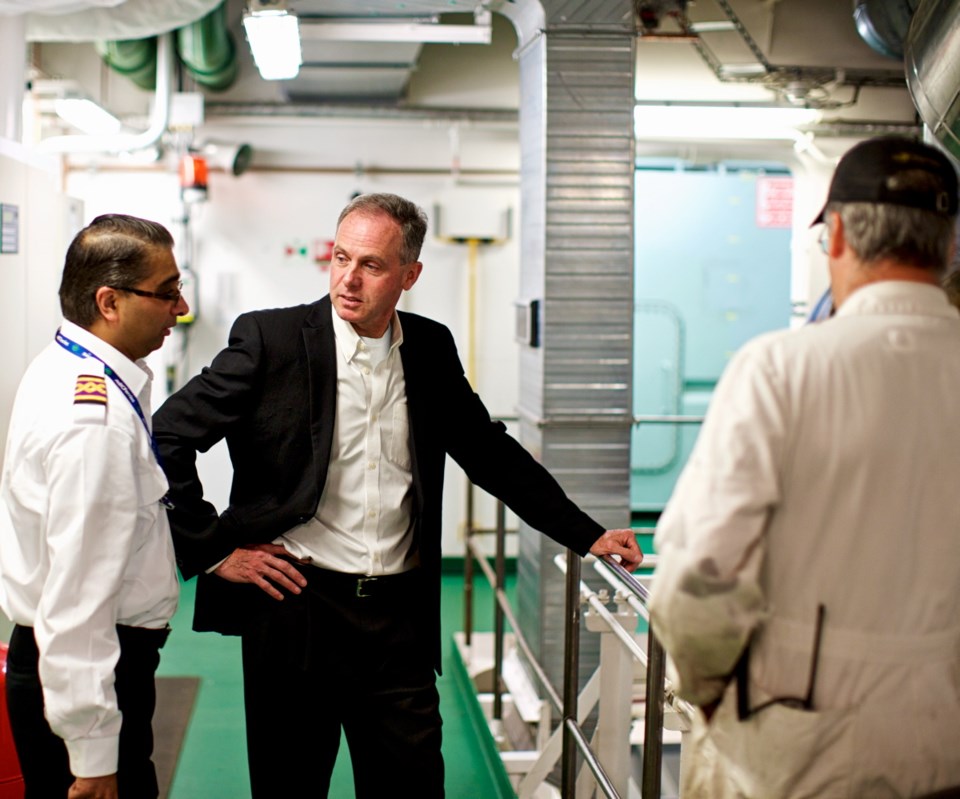When B.C. Ferries president Mark Collins walks into the engine room of the Spirit of Vancouver Island, his face lights up.
It’s clear this is where he feels at home.
Born and raised in St. John’s, N.L., Collins has “salt water in the veins,” he said.
Collins, 57, jokes that his father “taught me to sail around the same time he taught me to walk, because boats were everywhere in our family.”
“So very early days, we were knocking around in boats.”
His father was a radio officer who served as a merchant mariner in the Second World War. He was twice on ships hit by torpedoes. Collins’ father did the treacherous Murmansk Run, on which Allied ships left North America to deliver war supplies to the northern Soviet Union.
A love of boating remains with Collins, who explores the coast on the family’s cabin cruiser — often travelling the same waters as B.C. Ferries vessels.
“It’s become my kind of passion and hobby. That’s what I do when I want to disconnect from the job. I grab the family and we head out on the water.”
Collins has been married for 24 years to Leann, whom he met while earning a master’s degree in business administration at the centre for transportation studies at the University of British Columbia. Leann Collins is director of projects at the Association of B.C. Marine Industries. They have three children, ages 17, 15 and 12.
In his late teens, Collins headed to Alberta, where he completed an apprenticeship as an aircraft maintenance technician. Lack of work sent him back to the East Coast, where he earned a bachelor’s degree in marine geography from Saint Mary’s University in Halifax and a diploma in mechanical (marine) engineering from Memorial University in Newfoundland.
Collins has worked as a marine engineer officer on oil tankers, bulk carriers, container vessels and fishing boats.
He recalls “the worst job I ever had,” spending two weeks at a time in the Labrador Sea fishing for cod in February.
“If you want to see bad weather, what you’ve got to do is work on a fishing boat,” Collins said.
“We saw winds of 80 knots, which is hurricane strength, and we kept fishing. Fishermen don’t stop for anything. That industry is so tough. They’re tough people, tough ships, tough economics.”
That storm brought huge waves. “They were longer than the ship, and the ship I was on was 150 feet.”
After UBC, Collins headed back to Newfoundland, where he worked in sales with a small marine electrical company. The big prize came when the firm, partnering with another company, won a major contract on the Hibernia oil-field project in the Atlantic Ocean. “It was a huge moment for us.”
From there, he moved to B.C. to work at a firm that was bought by Rolls Royce. He joined in 1995 and served as president of Rolls Royce Marine in Italy and Rolls Royce Marine in Brazil, fulfilling his goal of international experience.
At B.C. Ferries, he served as vice-president of engineering from 2004 to 2012 and vice-president of strategic planning and community engagement from 2014 to 2017.
Collins has ridden all 24 routes, saying that those trips are reminders of the importance of a dependable service. “This is why we do our jobs.”
If something gets in the way of that, “groceries don’t get to the island. Kids don’t get to school, and people don’t get to see their doctors or their loved ones.”
Collins wants communities to know: “We get it. We understand the impact on your lives. And we are working hard to reduce those impacts.”
He praises frontline crew members who serve customers, saying: “There are a lot of people revved up all the time on the job.”
“My job is to break down the barriers to their success.”
Collins is almost poetic when talking about ships, describing a ship as “an entity, a living thing.”
“I get a real kick out of watching the engineers start up the engine room in the morning. Because it goes back to where I came from.”
